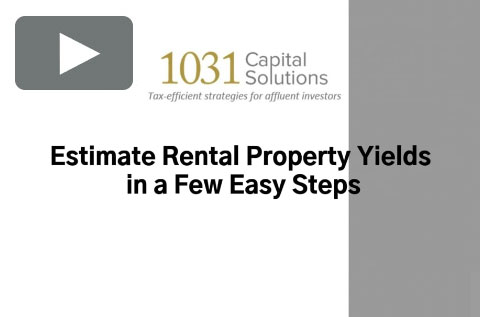
Estimate Rental Property Yields in a Few Easy Steps
Today, I want to give you a simple approach to estimating the investment performance of a rental property. Having a sense of a current rental property’s performance is critical in deciding whether to replace that property with another investment.
Specifically, any rental owner or agent should know two numbers about a listed property: what is its current estimated yield on total value, and what is its current estimated yield on equity.
The former number allows you to compare the rental to the purported cap rates of other listed properties. The second number allows you to compare the rental to the purported distribution rates of pre-packaged, passive replacement programs.
First, estimate the likely sales price of the rental today, net of expenses.
Second, estimate the current net annual income from the rental, after deducting all expenses including maintenance, utilities, management fees, property taxes and insurance. Don’t forget to assign value to the time the owner spends overseeing the property.
Divide the net income by the net sales price, and you have a yield-on-value roughly comparable to another property’s estimated cap rate.
Estimated NOI/Estimated Net Sale Price = Estimated Yield on Value (Comparable to “Cap Rate”)
To determine the rental’s yield on equity, deduct the current loan balance from the net sales price, and deduct the annual interest payment from the net income.
Finally, divide the modified net income by the current equity,
Estimated NOI – Debt Service / Estimated Net Sales Proceeds = Estimated Yield on Equity (Comparable to a “Distribution Rate”)
For more information, please give 1031 Capital Solutions a call today. Thank you.
This information is for educational purposes only and does not constitute direct investment advice or a direct offer to buy or sell an investment, and is not to be interpreted as tax or legal advice. Please speak with your own tax and legal advisors for advice/guidance regarding your particular situation. Because investor situations and objectives vary, this information is not intended to indicate suitability for any particular investor. The views of this material are those solely of the author and do not necessarily represent the views of their affiliates.
Investing in real estate and 1031 exchange replacement properties may involve significant risks. These risks include, but are not limited to, lack of liquidity, limited transferability, conflicts of interest, loss of entire investment principal, declining market values, tenant vacancies, and real estate fluctuations based upon a number of factors, which may include changes in interest rates, laws, operating expenses, insurance costs and tenant turnover. Investors should also understand all fees associated with a particular investment and how those fees could affect the overall performance of the investment.
Securities offered through Concorde Investment Services, LLC (CIS), member FINRA/SIPC. Advisory services offered through Concorde Asset Management, LLC (CAM), an SEC registered investment adviser. Insurance products offered through Concorde Insurance Agency, Inc. (CIA). 1031 Capital Solutions is independent of CIS, CAM and CIA.
continue reading
Related Posts
Changes are Happening Quickly – Don’t be Left Behind Managing […]
The Burdens of Managing Rental Property in Retirement Retirement should […]










